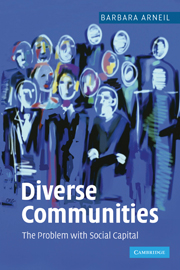Book contents
- Frontmatter
- Contents
- List of abbreviations
- Acknowledgements
- 1 Social capital, justice and diversity: an introduction
- 2 The Progressive Era: past paradise?
- 3 The present malaise in civic participation: empirical and normative dimensions
- 4 The causes of ‘decline’ in social capital theory
- 5 Civic trust and shared norms
- 6 Beyond Bowling Alone: social capital in twenty-first-century America
- 7 Justice in diverse communities: lessons for the future
- References
- Index
3 - The present malaise in civic participation: empirical and normative dimensions
Published online by Cambridge University Press: 22 September 2009
- Frontmatter
- Contents
- List of abbreviations
- Acknowledgements
- 1 Social capital, justice and diversity: an introduction
- 2 The Progressive Era: past paradise?
- 3 The present malaise in civic participation: empirical and normative dimensions
- 4 The causes of ‘decline’ in social capital theory
- 5 Civic trust and shared norms
- 6 Beyond Bowling Alone: social capital in twenty-first-century America
- 7 Justice in diverse communities: lessons for the future
- References
- Index
Summary
From this glorious period of an American society replete with social capital, Putnam's main focus in Bowling Alone is the current malaise, within which he postulates a general decline in social capital accumulation over the last forty years. Putnam measures the decline in the United States of public involvement from its zenith in the middle of the twentieth century in terms of political participation (through voter turnout, town hall attendance and service on committees, for example), trust in others, connections in the workplace, informal social connections (through survey data) and civic participation (by size of membership in voluntary associations). The sheer volume of data Putnam collects is impressive and he is careful to provide both a rigorous account of, as well as his doubts about, sources and methodology, within the text itself, and through notes, appendices and afterthoughts. He exhibits, in this regard, a very high level of scholarly integrity when it comes to the transparency of his analysis. As most academics know, it is possible to present one's findings with a perfunctory acknowledgement of both the sources of information used and any counter-examples that one may come across. Putnam represents the opposite, providing his own questions and doubts. His reflections on his own choices and methods, while making him more vulnerable to attack, simultaneously set a very high standard of transparency and openness of debate for those who wish to challenge him.
- Type
- Chapter
- Information
- Diverse CommunitiesThe Problem with Social Capital, pp. 41 - 91Publisher: Cambridge University PressPrint publication year: 2006



